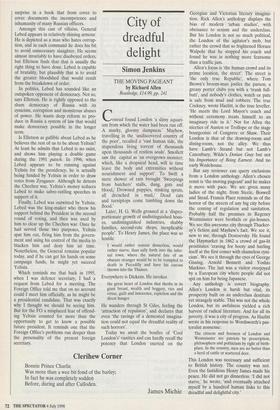City of dreadful delight
Simon Jenkins
THE MOVING PAGEANT by Richard Allen Routledge, £14.99, pp. 241 Conrad found London 'a slimy aquari- um from which the water had been run off. A murky, gloomy dampness.' Mayhew, travelling in the 'undiscovered country of the poor', recalled a 'vast human tide, the stupendous living torrent of thousands upon thousands of restless souls'. Smollett saw the capital as 'an overgrown monster; which, like a dropsical head, will in time leave the body and extremities without nourishment and support'. To Swift a mere shower of rain brought 'Sweepings from butchers' stalls, dung, guts and blood,/ Drowned puppies, stinking sprats, all drenched in mud,/ Dead cats and turniptops come tumbling down the flood.'
Later, H. G. Wells groaned at a 'dispro- portionate growth of undistinguished hous- es, undistinguished industries, shabby families, second-rate shops, inexplicable people'. To Henry James, the place was so hostile
I would rather remain dinnerless, would rather starve, than sally forth into the infer- nal town, where the natural fate of an obscure stranger would be to be trampled to death in Piccadilly and have his carcass thrown into the Thames.
Everywhere is Dickens. He invokes
the great heart of London that throbs in its giant breast, wealth and beggary, vice and virtue, guilt and innocence, repletion and the direst hunger.
He wanders through St Giles, feeling the `attraction of repulsion', and declares that even 'the ravings of a demented imagina- tion could not equal the dreadful reality of such horrors'.
Today we await the bonfire of 'Cool London's' vanities and can hardly recall the potency that London exerted on the Georgian and Victorian literary imagina- tion. Rick Allen's anthology displays the bias of modern 'urban studies', with obeisance to sexism and the underclass. But his London is not so much political, the London of the agitator's mob, but rather the crowd that so frightened Horace Walpole that he stopped his coach and found he was in nothing more fearsome than a traffic jam.
Allen's focus is 'the human crowd and its prime location, the street'. The street is `the only true Republic', where Tom Brown's broom-man jostles the parson, a greasy porter clubs you with a 'trunk full- butt', and nobody's clothes, watch or pate is safe from mud and robbers. The true Cockney, wrote Hazlitt, is the true leveller. `He meets the Lord Mayor's coach and without ceremony treats himself to an imaginary ride in it.' Not for Allen the niceties of Austen or Trollope or the stage bourgeoisie of Congreve or Shaw. Their London is that of the drawing-room and dining-room, not the alley. We thus have Lamb's Strand but not Lamb's Canonbury, Wilde's Dorian Gray but not his Importance of Being Earnest. And no early Wodehouse.
But any reviewer can query exclusions from a London anthology. Allen's chosen remit is 'the moving pageant' and he makes it move with pace. We are given many ladies of the night, from Steele, Boswell and Stead. Francis Place reminds us of the horror of the streets of any big city before the coming of regulation and sanitation. Probably half the premises in Regency Westminster were brothels or gin-houses. We see this awesome city through Thacker- ay's fiction and Mayhew's fact. We see it, new to me, through Dostoevsky. He found the Haymarket in 1862 a crowd of gas-lit prostitutes 'craving for booty and hurling itself at the first comer with shameless cyni- cism'. We see it through the eyes of George Gissing, Arnold Bennett and Yoshio Markin. The last was a visitor overjoyed by a European city where people did not spit on him for being Japanese.
Any anthology is covert biography. Allen's London is harsh but vital, its prosperity built on an underclass destitute yet strangely stable. This was not the whole London, but its awfulness yielded a rich harvest of radical literature. And for all its poverty, it was a city of progress. As Hazlitt wrote in his response to Wordsworth's pas- toralist nonsense:
The citizens and freemen of London and Westminster are patriots by prescription, philosophers and politicians by right of birth- place. In the country, men are no better than a herd of cattle or scattered deer.
This London was necessary and sufficient to British history. The country was not. Even the fastidious Henry James made his peace. He did not go dinnerless. 'I did not starve,' he wrote, 'and eventually attached myself by a hundred human links to this dreadful and delightful city.'














































































































 Previous page
Previous page